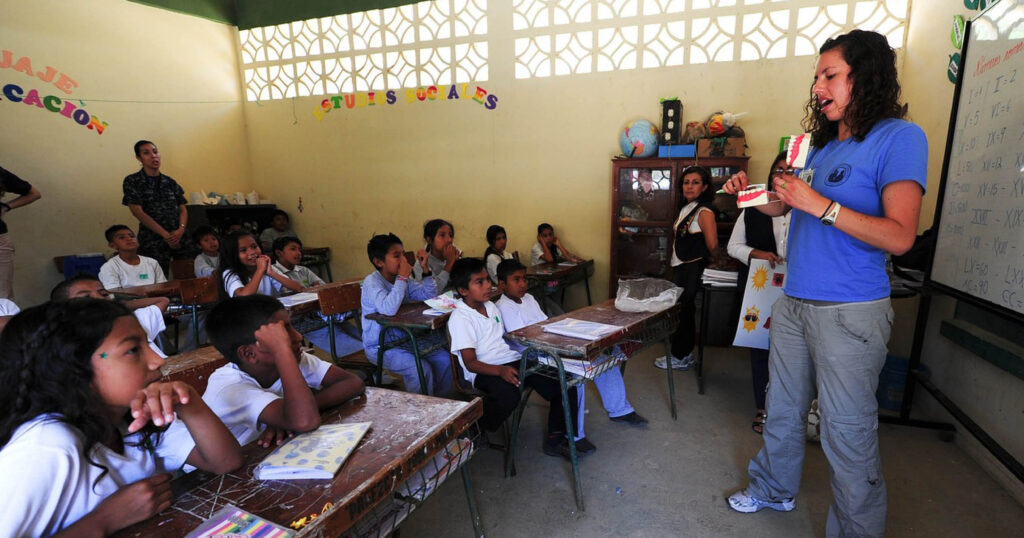Working while you travel is the best way to afford an extended trip — and you don’t have to be a full time digital nomad to do it! It’s a super fun way to gain valuable professional/ life experience in unfamiliar environments, which can be both exciting and challenging. Here are some great types of nomad jobs to consider so you can extend your time abroad.
Entry-level nomad jobs
These are perfect nomad jobs if you’re just starting your extended travel journey! They’re usually easier to land and require much less responsibility, giving you more time to chill and enjoy the place you’re living. AND you can get them when you’re fresh out of school or don’t have a lot of work experience yet.
Life hack: You don’t have to sell your house and quit your 9-5 job if you never get those things in the first place.

Serving / Restaurant Work
Perfect for people who love: fast-paced environments, multi-tasking, communicating, working unusual hours or irregular schedules.
Requirements: proficiency in the local language, outgoing personality.
I was a server for years in Canada before I moved abroad for the first time and it’s a great skill set you can use basically anywhere in the world. But here’s the thing — tips make all the difference. And maybe I’m biased, but while the US has the same tipping culture, I’d argue Canada is the best place in the world to work as a server/bartender. Here’s why…
The federal minimum wage for service staff in the US is a horrifying $2.13 USD. But if you work at an expensive restaurant or you’re just *that* charming, you can do pretty well in tips. In Canada? The minimum server wage is $15 CAD, or $11 USD, and you still get tips. The average tip these days is about 20% of the bill (which is a little ridiculous but that’s another post for another day). So if you’re busy and don’t spill stuff on people, you can easily make $200+ per night on top of your wage.
If you work basically anywhere outside North America you may earn an extra 5-10% occasionally. But it’s not part of the whole culture like it is in Canada & the US.
Then of course there are kitchen roles, which may be more your thing if you love food, aren’t fluent in the local language, or hate talking to people. Kitchen staff make anywhere between 0 and 2% of the server’s tips, so these jobs are definitely not as lucrative.

Language Teacher
Perfect for people who: love kids, are native speakers or fluent in the language. (Some schools even have a preference for what accent you have, with UK and US being the most common.)
Requirements: a degree in any subject (some exceptions to this), a Teach English as a Foreign Language (TEFL) certificate, the ability to commit to an 8 to 10-month school year.
I’m going to write this with a focus on English, but of course there are lots of opportunities to teach other languages all over the world! I worked as a teacher in Spain and nearly every international friend I made was doing the same. There are opportunities to work at schools or do after-school lessons at an academy or at students’ homes.
I worked at an elementary school in the morning and did after-school lessons, and usually went to the beach in between — life was good. You can also work for an online English school and work from anywhere.
TEFL courses may put you in touch with language schools for jobs. You can also just look for jobs online before you move to a new country — but beware of scams! A real job will never ask you to pay anything to secure the role, and won’t send you money before you start.
Note: Schools in countries like Korea and Japan are more selective and usually prefer applicants with English degrees. (In contrast, I rolled up to Spain with a college diploma in marketing and that was fine.)

Au Pair Nomad Jobs
Perfect for people who: love kids, don’t want to pay rent
Requirements: experience caring for children
Families often looks for au pairs/nannies, who can take care of their kids during the day, after school, or over the summer. The role involves care taking, language practice, taking kids to/from activities. In exchange, you’d likely live in the family home for free and have most of your meals covered. There’s usually a less-than-minimum hourly wage as well, so it’s not one of the most lucrative nomad jobs, but it’s very chill!
While this is an entry-level job, most parents want to make sure you have at least some experience caring for kids. If you have any babysitting or teaching experience, this can go a long way in your application.
Parents also usually look for au pairs who can speak a different language to the one their kids speak at home. So if you speak English well, you’ll have lots of opportunities all over the world. But if you also speak French or Spanish, for example, you’d have a good shot at landing a nanny job in Australia as well.
I have a friend who speaks English as her first language and we learned French throughout school as our second. She moved to France to be an au pair and got to help the kids learn English while practising her French in her day to day life. Win-win! She had a good time, but I’ve also heard some horror stories where the families are terrible people, so don’t be afraid to ask lots of questions and have a couple Zoom calls to get a vibe off them before you commit. Check out Au Pair World.

Hotel / Hostel Jobs
Perfect for people who: have great interpersonal skills and are organized.
Requirements: proficiency in the local language — the ability to speak another languages is a highly valuable skill.
The sky’s the limit here. You could work at a cheap hostel in Australia in exchange for free accommodation or manage a resort in the Maldives. Those are the two extreme ends, but ya know.
Entry-level nomad jobs you can take on at a hotel include front desk, concierge, cleaner, room service, porter, or on-site restaurant staff. If you work somewhere like a Hilton or Sheraton, you can usually move to a new hotel in their global network quite easily. Schedules are usually flexible as hotels are open 24/7. So you have to be prepared to work changing schedules and maybe some early mornings or overnights when you first get started.
A huge benefit to combining work and travel with a job at a hotel is that you’ll get nearly instant access to great local knowledge. The hotel will brief you on this because you’ll need to be able to share this with guests. Being able to communicate in more than one language is a huge asset, so make sure to feature that on your resume!

Tour Guide
Perfect for people who: are social, knowledgeable, and are comfortable public speaking.
Requirements: some roles require a licence, and some education or certification in whatever niche you choose is always an asset.
Find something you’re passionate about and share your knowledge as a tour guide. You can find entry-level roles doing anything from guiding people through a museum to white water rafting. You may deal with some weirdos or super high-maintenance people, and you have to stay on your toes to make sure you’re meeting everyone’s needs. But helping people learn more about a new place or introducing them to a fun activity can be super rewarding.
This is also a great job opportunity if you’re a recent graduate and want to gain experience in a relevant field. For example, if you have a marine biology degree, you might find a job on a whale watching boat in Reykjavik. You like dinosaurs? See if the Royal Tyrell Museum in Alberta is hiring. If you’re an art history major, you can work at the Louvre in Paris or the Prado in Madrid. Ok fine those last two might be shooting a little too high for entry-level roles, but anything is possible.
We always meet really cool people working as guides when we do outdoor adventure activities that require guides — even bungee jumping! (The guy tying me to the cord told me he’d just started two weeks ago and had no experience, which was terrifying, but my fault for asking. I didn’t die, so good for him.)
As tours are rarely conducted in more than one language at a time, you can find these nomad jobs without being fluent in the local language. Like, you could live in Japan and speak absolutely no Japanese but still find a job offering tours around Tokyo or Kyoto to other English-speakers.

Fruit Picking / Other Farm Work
Perfect for people who: like manual labour, working outdoors, and don’t mind living in rural areas.
Requirements: reasonable physical fitness.
One of the classic nomad jobs! These jobs are super popular in Australia and New Zealand among backpackers. I worked on a cherry farm in Australia and didn’t actually have to pick the cherries, I just helped sort and package them. It was fun because I got to live on the farm for free with a bunch of other backpackers from all over the world. The downside? It was in rural Tasmania, cold, I had no car so I had to hitchhike to get groceries, and the work was painfully boring. And the pay wasn’t great. Farm work wasn’t for me, but I know lots of people who worked in other areas and loved their time on the farm!
Personally, I feel New Zealand is a way better choice if you can’t decide between the two, because there are no snakes and the spiders you may encounter in the world can’t kill you. Something that definitely can’t be said for Australia.
Jobs you can get on a farm include: fruit picking, animal farmhand, forklift operator (you need a licence), packhouse worker.
Nomad jobs that require some career experience
The mid-level nomad jobs are good to explore when you have some work experience under your belt and want to take your career global.

Temp Office Jobs
Perfect for people who: like a steady routine and enjoy office environments.
Requirements: usually a degree or diploma, fluency in the local language, computer literacy.
The best way to get started with one of these temp nomad jobs is to find a recruitment agency. I struggled to find office work on my own when I first got to New Zealand, so I contacted some recruiters. I interviewed with an agency and then they found me some short-term work (without me having to interview with the company directly). You’re also not obligated to take any jobs, they just called to offer me an opportunity and I said yes to the first one.
I ended up doing 3 different jobs over 1.5 years: I recorded city-wide government survey results, processed annual dog registrations, and ended up being a communications coordinator for the Auckland rail network for nearly a year. My 6-week contract turned into a full-time gig!
Some temp jobs you can find include: front desk/office reception, data entry, answering phones, customer service support.

Call Center (Sales/Customer Support) Nomad Jobs
Perfect for people who: like office environments, have an outgoing personality.
Requirements: fluency in the local language, computer literacy, sales/customer service experience may be a requirement.
There are always call center nomad jobs going, but you’ll need to be fluent in the local language to excel at this. Sales-based ones (especially outgoing sales calls) can be challenging unless you have that sales-y nature, so I recommend finding a role with incoming calls.
Benefits to these jobs is that they sometimes offer bonuses for hitting sales targets or meeting efficiency goals. You can sometimes do these jobs remotely as long as you have the right gear (your own computer, a headset, etc.).
I did this in Australia and only lasted two weeks — I was on outgoing sales calls trying to get people to swap energy providers. It was probably the most boring thing I’ve ever done. People can be pretty mean when you call them out of the blue. (Fair enough.) Someone literally told me to “get another job” before hanging up, and I was like, you know what? He’s right. Then quit a couple days later, lol.
However, that’s not to say all call center jobs are bad! But I highly recommend finding something with incoming calls so people don’t immediately start the conversation annoyed at you.
Volunteer nomad jobs
You rarely get paid for these “nomad jobs,” but you work for a few hours per day in exchange for free accommodation (and sometimes food). While you won’t bank money, it’s a fun way to travel on the cheap and meet lots of people.

Workaway
Perfect for people who: like moving to new locations regularly, enjoy manual labour.
Requirements: depend on the role.
This one is pretty broad! You can find nomad “jobs” doing everything from gardening and cooking to helping at animal sanctuaries and building a house. Browsing Workaway in a few countries you want to visit can also help you find places off-the-beaten-path that you’d never have gone to otherwise.
My Workaway experience was weird — in a good way. I thought I was going to be responsible for gardening and cleaning up around the house so I could afford to see the beautiful island of Zakynthos (and neighboring Kefalonia).
But when I got to the house, the host was a 25-year-old stripper from the UK who just had a big house and wanted to be generous by letting me stay there. I did some very minimal cleaning every day, but other than that, we kinda just hung out.
I got to borrow her bike to explore the island and spent my days at the beach, on boats, or snorkelling with turtles. So I can barely count it as a Workaway experience at all! Then I was also booked in to help with guest reception at an ayahuasca retreat in rural Peru (Iquitos), but it fell through at the last-minute.
The best gigs you can find on Workaway will likely want you to have some experience under your belt. You need a membership to the platform to find opportunities. But it’s under $100 and pays for itself pretty quickly with what you’ll save on accom. This is a good way to travel to expensive countries and keep your costs down, and gain work/life experience.

Housesitting / Petsitting
Perfect for people who: like moving to new locations regularly, like animals, are happy to be home a lot.
Requirements: usually some experience taking care of someone else’s home and/or pets.
Like Workaway, these opportunities are usually unpaid (but not always!) The main benefit is that they let you find cool places to live off-the-beaten-track. And you get to hang out with kittens and doggos. If you’re like me and want a pet but also can’t stop travelling, this is the best of both worlds.
A potential downside is that you have to be home most of the time. You can’t really go for a long weekend camping trip when the dog is home alone — the whole point of you being there is to keep the animals company and watch the house!
If you have a digital nomad job (writing, editing, graphic design) housesitting and petsitting are great to combine with the remote work lifestyle to pay next to nothing for rent and continue making money. Check out Trusted House Sitters!
Get a Working Holiday Visa to kick off your work and travel lifestyle
Perfect for people who: are under 30 and want to stay somewhere for one or two years.
Working Holiday Visas (WHVs) are the best way to work and travel with all the legal boxes ticked before you even arrive in the country. This is how I moved to Australia when I was 20, and New Zealand when I was 25.
They usually cost a few hundred bucks and require a medical exam, but that’s easy and totally worth it. It opens you up to way more nomad jobs than if you try to work for cash-in-hand!
Most countries only offer WHVs to people 30 and younger
(Hurts just a little bit.) However, a few countries, including Australia, Canada, Hungary, and Chile, have upped their age limit to 35 for some nationalities, and some countries offer two-year visa options.
Typical jobs for WHV holders include construction, serving, hotel/hostel roles, and fruit picking. Farm work is a major thing in New Zealand and Australia because if you work on a farm for three months they’ll let you extend your visa for an extra year. (I tried cherry picking in Australia and absolutely hated it so I gave up the idea of staying lol.)
If you’re like me and hate farms, you can also work in a restaurant, movie theatre, retail store, grocery store, etc. etc.

